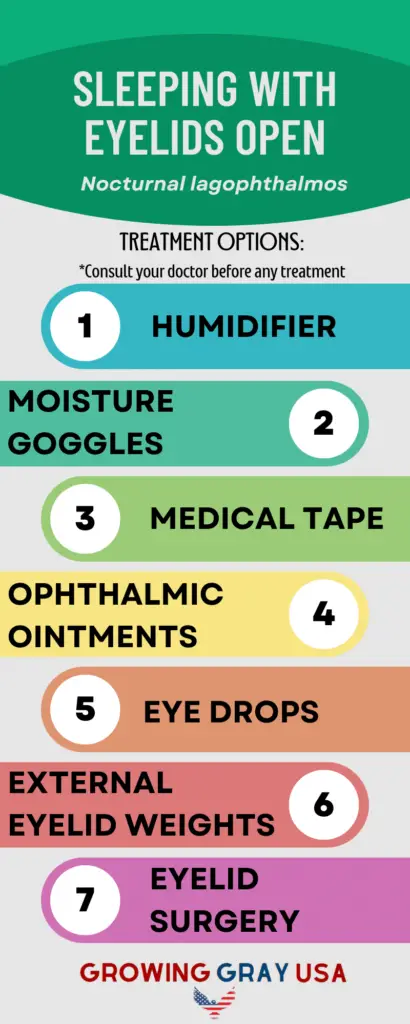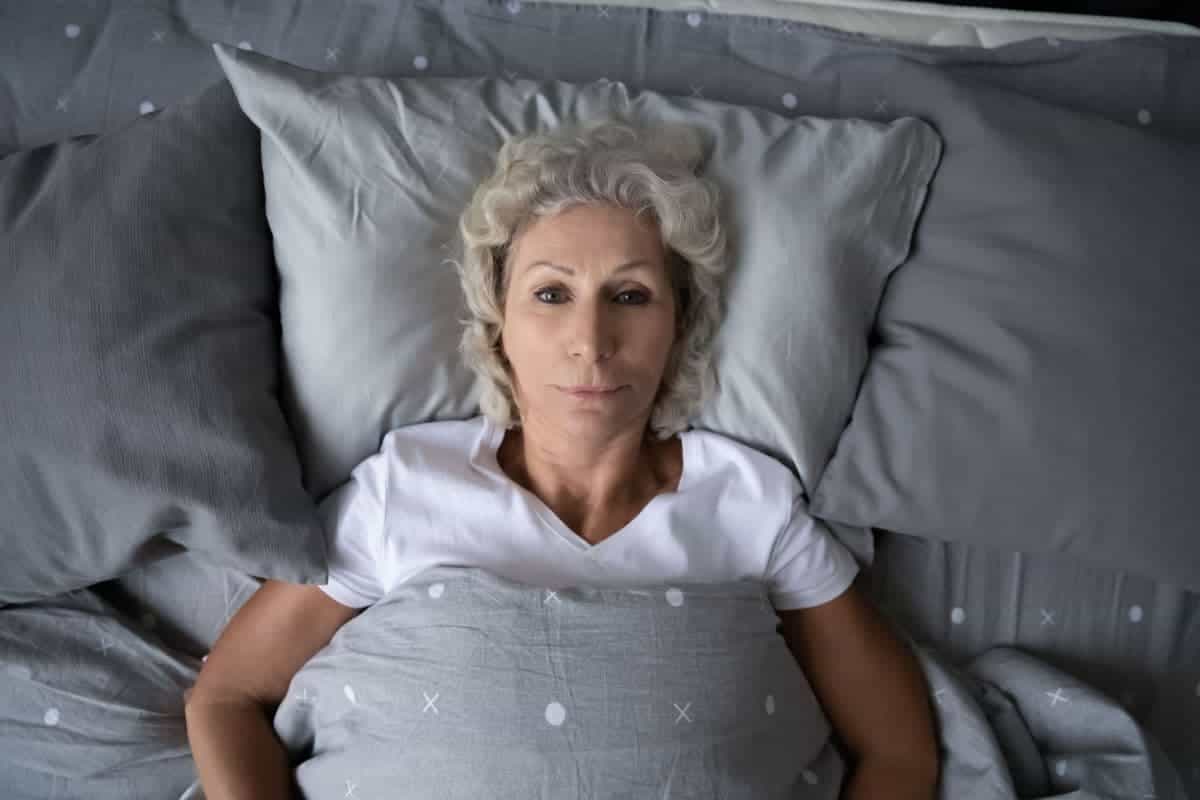This post contains affiliate links.
Have you ever noticed that some elderly people sleep with their eyes partially open? It might simply be a quirk or a trait that runs in the family, so most people might brush this off as something trivial. However, it’s something you should seriously look into because it might be affecting the person’s health and wellness.
Elderly people sometimes sleep with their eyes open because of a condition called nocturnal lagophthalmos. Nocturnal lagophthalmos is usually caused by a more serious underlying condition of facial muscles and nerves, so it’s best to consult a doctor at once. Treatment can help improve the quality of sleep and overall wellness.
In this article, we’ll discuss why an elderly person sometimes sleeps with their eyes open, what underlying conditions may be causing this, and what symptoms to watch out for. We’ll also discuss the consequences of not having this condition checked and how you can improve the affected person’s quality of sleep. Let’s get started!
Why the Elderly Sometimes Sleep With Their Eyes Open
If you have an elderly parent and you notice that their eyes tend to remain open while they sleep, this may be due to nocturnal lagophthalmos. This is a condition that affects facial muscles and nerves, making it difficult for the affected person’s eyes to remain closed as they sleep.
Having nocturnal lagophthalmos doesn’t necessarily mean that a person sleeps with their eyes wide open. Often, a person with this condition will have a small gap in their eyelids as they sleep.
Why Keeping the Eyes Fully Shut During Sleep is Crucial
It’s crucial to keep our eyes completely shut as we sleep. Just as our bodies are given time to rest and recuperate while we slumber, so do our eyes get their share of relaxation and rejuvenation. Our eyes can only do so if our eyelids are fully closed.
Shutting our eyelids allows us to block light, which is a critical factor in enjoying a good night’s sleep. It facilitates the calibration of our body’s internal clock or circadian rhythm, which relies on light and darkness in regulating patterns like the sleep-wake cycle. Disruptions in the body’s 24-hour internal clock affect wakefulness, proper hormone release, digestion, and adequate body temperature regulation.
Furthermore, when our eyes are shut, our eyeballs become saturated in a layer of fluid (essentially, tears) necessary to maintain moisture for the eyes to function properly. Tears are also in charge of ridding the eyes of dirt, dust, and unwanted particles that may have somehow gotten in. We also enjoy these benefits whenever we blink throughout the day.
What To Expect With Nocturnal Lagophthalmos
If the eyes aren’t adequately lubricated, problems will undoubtedly arise. Therefore, waking up after sleeping with your eyes partially open cannot possibly be a great thing. Naturally, it would come with many side effects, so you can be sure that you’ll be hearing some complaints soon after the person wakes up.
Here are some issues to expect:
- Dry eyes: The person may wake up feeling like there’s sand in their eyes.
- Pain and discomfort: There may be some itchiness, redness, and pain in the eyes. Some may complain about blurry vision and sensitivity to light, especially during the first few minutes after waking up.
- Irregular sleep: Quality of sleep is affected since it may be difficult for an affected person to stay asleep due to the uncomfortable effects mentioned above.
- Foreign body sensation: This refers to the feeling that something is stuck in the eye even if there is nothing.
It is not a good idea to leave nocturnal lagophthalmos unchecked. It’s best to consult a doctor immediately, especially if the symptoms worsen. Severe side effects may be experienced if the condition remains uncontrolled; worse, a serious underlying condition might exist.
It is important to note that sleeping with the eyes open may sometimes be purely hereditary and should not be a cause for alarm. It sometimes runs in families, especially those gifted with thick lashes in both the lower and upper lids. So, if you’re worried about an elderly parent who sleeps with their eyes open, you might want to do some investigation within your family first.
Underlying Conditions Related to Nocturnal Lagophthalmos
Nocturnal lagophthalmos typically stems from other conditions that result in defects in facial muscles, nerves, and the orbicularis oculi — the muscle responsible for shutting our eyelids. These underlying conditions must be promptly addressed to help minimize the symptoms of nocturnal lagophthalmos.
Here are some possible underlying conditions worth considering:
- Tumor
- Neuromuscular disease
- Bell’s Palsy
- Graves’ Disease
- Moebius syndrome
- Guillain-Barré syndrome
- Lyme Disease
- Leprosy
- Botulism
- Diphtheria
- Stroke
- Mumps
- Chickenpox
- Bulging eyeballs resulting from hyperthyroidism
- Damage from a previous surgery involving the face and eyes (specifically, eyelid surgery, which is pretty common among the elderly)
Repercussions of Unchecked Nocturnal Lagophthalmos
Is It Okay To Leave Nocturnal Lagophthalmos Unchecked?

A seemingly simple case of eyes that don’t shut completely during sleep may quickly turn into something more serious, especially when the elderly are involved.
Here are some complications you might be able to avoid if you get nocturnal lagophthalmos checked immediately:
- Eye infections
- Eye injuries (typically from frequent rubbing and scratching)
- Corneal abrasions
- Corneal ulcers
- Exposure keratopathy
- Loss of vision
How To Treat Nocturnal Lagophthalmos
A visit to the doctor will set things straight about the severity or inconsequentiality of a diagnosed case of nocturnal lagophthalmos. If the doctor rules that it’s something not particularly serious but still requires care and attention, there are certain things you can do at home to help make the affected person more comfortable.
Here are some products that can help manage nocturnal lagophthalmos at home (make sure to check with your doctor first before trying any of these):
Humidifier
A humidifier can help promote quality sleep for your elderly parent by relieving dry eye symptoms. The VIVOSUN Cool Mist Humidifier (available on Amazon.com) has customizable humidity settings, and it’s equipped with a timer function. It runs quietly and is equipped with a sleep mode that lets you turn off all distracting lights and sounds. You can even use it as an essential oil diffuser.
Moisture Goggles
Moisture goggles can help provide nighttime relief from dry eye symptoms. They can shelter the eyes from dust, drafts, and the effects of low humidity. The Tranquileyes Travel and Sleep Kit Sleep Mask (available on Amazon.com) comes with moisture pads that can be soaked in water before use to help boost humidity around the eye area. It’s perfect for elderly people who sometimes sleep with their eyes open because it’s comfortable and easy to use.
Medical Tape
You can tape the affected person’s eyes shut with the help of medically-safe tape. This Transpore Medical Tape (available on Amazon.com) is hypoallergenic, so it’s safe to use for your elderly parent’s sensitive and thinner skin around the eye area. Because they are perforated, you can easily tear the strips into your desired width and length.
Ophthalmic Ointments
Make sure to ask for your doctor’s recommendations on specific brands that are both effective and safe to use for the elderly. An eye ointment will help relieve pain, itchiness, and redness. It will also aid in speeding up the healing process of ulcers and scratches in the eyes.
Eye Drops
Eye drops or artificial tears may be used throughout the day, especially right before bedtime, to keep the eyes adequately lubricated. This will not improve the affected person’s ability to keep their eyes shut while they sleep, but the added moisture will help them feel more comfortable. Ask your doctor for product recommendations, and make sure to follow instructions strictly.
External Eyelid Weights
External eyelid weights are worn on the outside of the upper eyelids to help them stay shut while a person sleeps. They depend on gravity to keep their eyes fully shut. It’s a practical, non-surgical method to help a person affected with nocturnal lagophthalmos to enjoy better sleep.
Eyelid Surgery
Some doctors recommend a special type of eyelid surgery to help the affected person sleep better. Specially designed weights are implanted into the eyelids, just above the upper lashes, to help them fully close. However, extra precautions are advised concerning this method, especially when elderly people are involved. The implants are typically not noticeable after the swelling, redness, and bruising from the surgery have subsided.
Have you ever noticed your elderly parents talking in their sleep? Why does it happen? Click on the link to learn more about the reasons and how you can help them. Why is Your Elderly Parent Talking in Their Sleep?
Key Takeaways
“If you’re concerned about the well-being of an elderly family member who tends to sleep with their eyes open, remember that keeping them safe and connected can make a huge difference. Lively’s range of user-friendly products can help! They offer easy-to-use smartphones and emergency response devices that are perfect for seniors. With Lively, not only can seniors reach out for help if their nocturnal lagophthalmos symptoms worsen, but they can also stay connected with their family and friends easily. It’s about peace of mind and ensuring they have support when they need it.” Check them out at Lively.com
Sleeping with the eyes partially open may not seem serious, but in the elderly, it’s worth looking into since it can lead to worsening symptoms and severe adverse effects. It can also signify a more serious underlying medical condition.
If your elderly parent sometimes sleeps with their eyes open, accompany them to the doctor as soon as possible. It’s wise to treat nocturnal lagophthalmos before it progresses into a more serious issue. You can also employ various methods at home, such as plugging in a humidifier or using eyelid weights, to help improve your elderly parent’s quality of sleep.
Tenuto Properties LLC dba Growing Gray USA is a participant in the Amazon Services LLC Associates Program, an affiliate advertising program designed to provide a means for sites to earn advertising fees by advertising and linking to Amazon.com. We also participate in other affiliate programs which compensate us for referring traffic.



